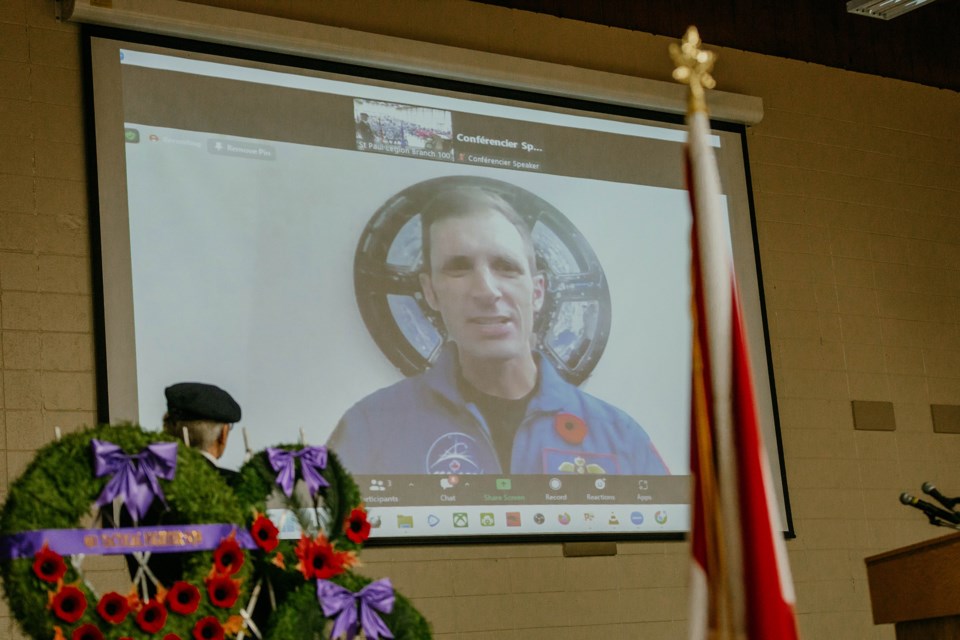LAKELAND - Test Pilot. Fighter Pilot. Mechanical Engineer. Three master's degrees – one in space studies, flight test engineering, and defense studies. It’s not bad for someone who grew up on a cattle farm in rural Alberta.
With 4,000 hours of flying experience on more than 40 aircrafts, astronaut Joshua Kutryk is ready to blast into space onboard the Starliner-1 to reach the International Space Station.
The six-month long mission will start in early 2025, but for now, he’s in Houston at NASA’s Johnson Space Center, training and preparing with fellow astronauts.
Joining elite company, he will be the fourth Canadian astronaut ever sent to the International Space Station.
“Looking at the night prairie sky - it's awe inspiring. It still is to this day, to see that the dark sky in the Milky Way and just gaze at it and think about how little we are and how little we actually know,” says Kutryk, speaking with Lakeland This Week. “You do see a lot of stars out there - more than you'll ever see in the city.”
Growing up near Two Hills, a town located 140 km east of Edmonton, Kutryk had plenty of time to spend outdoors, working with machinery, but he also had a passion for science. A Canadian Space Agency video shows a picture a junior-high-aged Kutryk, beaming with braces as he shows off his “Ethanol as an Alternate Fuel” project.
After graduating high school, Kutryk made the bold decision of travelling thousands of kilometres away from small town Alberta to Royal Military College of Canada in Kingston, Ont.
“I certainly was anxious about it when I was trying to make the decision at the time,” he acknowledges.
Now, Kutryk is 41, with a family of his own. Danger also comes with the job – something Kutryk knows well as a fighter pilot who served in Libya briefly. He explains how those missions have a lot in common with being an astronaut. Both are about excelling in high-risk, high consequence environments.
“The big story is not about what you do on that day. It's about the years and years and hundreds of people that put in years of work to get you to that day,” says Kutryk.
Thinking of movies like Gravity and The Martian, while these movies involve made-up scenarios, they realistically showcase the mental and physical strain of being an astronaut.
Looking at real-life space disasters like the Space Shuttle Challenger, it reveals how even the tiniest of errors can lead to catastrophic results.
Kutryk admits he’s not much of a movie guy, but enjoyed Apollo 13, a real-life story about three astronauts who overcame a life-threatening oxygen explosion and returned to Earth against all odds. “They did a really good job of capturing what actually still happens here at Johnson Space Center,” he says. “Tom Hanks was here a couple of days ago and I got to meet him and tell him just how much I enjoyed that movie.”
Unlike having the reckless, cocky attitude of fighter pilot Maverick in Top Gun, Kutryk is calculated and humble.
“There is a lot of risk,” he says. “We take it seriously.” But for Kutryk, the risks are all about advancing technology, scientific discovery, and innovation.
The preparation that goes into becoming an astronaut is immense. There’s no booking a flight back to Earth on a space mission.
He admits there's very little outlet for rest. On top of that, astronauts have to cope with isolation under the stress of a high-risk environment.
How well has he been trained? A couple of years ago, he did a caving expedition living in underground Europe for three weeks conducting biology work.
As for the experiments he’ll be conducting while in space, Kutryk isn’t completely sure at this point. What he does know is that they’ll be directly related to problems on Earth. “I would say that the majority of them have to do with the human body,” he says. The zero-gravity environment creates unique testing conditions for studying abnormalities and sicknesses related to the cardiovascular and muscular system.
“Being in space is a little bit like taking many different aging processes and hitting fast forward on them. It's not good for us. Our body gets weakened in a variety of ways,” he says.
As for the importance of space exploration, Kutryk is proud of the contributions Canada has made to the International Space Station. One of the most well-known contributions is the Canadarm, a remote-controlled robotic arm, which could deploy, capture and manoeuvre payloads.
When asked how exploring space could lead to a better future, Kutryk brought up the example of the innovation of airplanes. When air travel was invented in the 1920s, it wasn’t clear how the technology would help humanity. “We couldn't imagine, we couldn't define it, but we knew it was going to happen,” he says. “And of course, the world fundamentally changed because of airplanes.”
Kutryk also notes the international co-operation required for space missions. “We are co-operating with Russia in outer space and that is a testament of space exploration - it brings countries together.”
His biggest piece of advice for aspiring astronauts is to find their passion. “I think you want to find that thing that will get you out of bed at 4:30 in the morning, and drive you all day long,” he says.
He explained how NASA’s astronauts come from a variety of backgrounds. “We have teachers, doctors, surgeons, researchers, geologists, physicists, veterinarians, but what they have in common is they were very passionate about something.”
In an era of rapidly evolving technology, who knows what’s next for humanity? NASA is already planning on sending astronauts to Mars in the late 2030s.
“Despite all the bad things going on the planet right now, we are still incrementally making progress. We're getting better. And it's because we've never stopped exploring,” says Kutryk.



